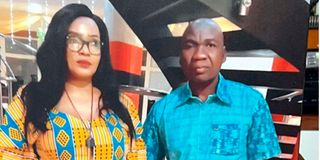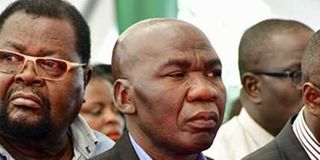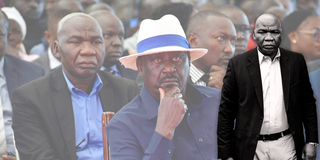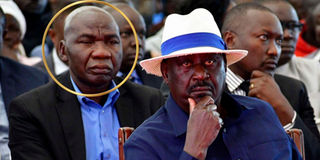
Caren Auma Odiyo with her husband, the late George Oduor, a long- serving bodyguard and aide to Raila Odinga.
In a bedroom secluded from the tens of mourners filling her living room, Caren Auma Odiyo's grief hangs heavy in the air. Yet as she begins to speak about her late husband, George Oduor—the man who shadowed opposition leader Raila Odinga for three decades—unexpected flashes of laughter punctuate her tears.
Seated beside me on her bed, she unfolds a story not of politics or power, but of a deeply private man whose most profound loyalty was witnessed by few. This is George Oduor as only his wife knew him—the unseen guardian behind one of Kenya's most influential political figures.
“There’s something most Kenyans don't understand about my George. Everyone sees the stern-faced bodyguard in the background of news clips, the human shield constantly scanning for threats behind Jakom—that's what I call Raila, just like George did, never "Baba" like most Kenyans do. They see the professional, but miss the man with his own rituals and quirks that made him who he was.
I still burst into laughter remembering my first trip to America with George. The traffic lights fascinated me—so orderly, so different from Nairobi! We were crossing a street, and I was mesmerised by the pedestrian signals, carefully waiting for the little walking man to appear. Meanwhile, George—who had absorbed Jakom's quick, purposeful stride after years of security detail—was already halfway across the intersection.
When he noticed I wasn't beside him, he turned back with a playful grin. "Caro!" he called, "You're walking just like Mama Ida!" He started laughing. "Now I understand why Jakom sometimes gets ahead of Mama during public appearances. These political men move too fast for us!" He jogged back to me, still chuckling, and added with mock seriousness, "But don't cross until the light changes—in America they'll arrest you for jaywalking, and I don't think Jakom's influence extends to American traffic police."

George Oduor at a past event.
We both dissolved into giggles right there on the sidewalk. Even thousands of miles from Kenya, George's world still revolved around the rhythms and habits of his work with Raila. It was impossible not to find it endearing—how thoroughly his identity had blended with his duty, even on our vacation.
When I met George during Orwa Ojode's parliamentary campaign in Ndhiwa in 1994, he wasn't yet the political fixture he would become. We were both young, struggling to find our footing. After I moved to Nairobi to stay with my sister in Lang’ata, he tracked me down. He was sharing a house with his brother in Kaloleni, and soon I joined them. Six months later, with savings from my insurance sales job, we rented our own single room in Kayole.
Raila's bodyguard
People look at me strangely when I say this, but George was Jaramogi's youth before he was ever Raila's bodyguard. He told me this when we were still dating—his admiration for Oginga Odinga ran deep. While other youths would become unruly when promised payments were delayed, leaking party secrets out of spite, George remained steady. That's how Raila first noticed him. "He stood out," George told me once. "I was patient. I understood the money wasn't always there, that Jakom was struggling too."
The first time I truly understood the danger of his position was August 1998. The political tension between President Moi and Raila erupted, and suddenly George was arrested inside Parliament itself. For a week, he simply vanished.
Those seven days were the longest of my life. I couldn't eat. I couldn't sleep. Every knock at the door sent my heart racing, thinking it might be news about George—or worse, that they were coming for me too. I became a ghost, haunting police stations. First, someone whispered he might be at Kileleshwa. I rushed there, only to be told with cold indifference, "He's not here. Try Muthangari." At Muthangari, suspicious eyes examined me. "How do you know your husband is here?" they demanded, as though my search for my own husband was somehow criminal.
The CID officers decided I must be hiding something. "We need to check your house," they announced. I had no choice but to lead the stern-faced officers back to our tiny room in Kayole. They tore through everything—our clothes and our few possessions, supposedly looking for weapons.
"Where are the guns?" they kept asking. "What guns?" I replied, trembling. "We don't have any guns!" They didn't believe me, convinced that anyone connected to Raila must be harbouring weapons.

The late George Oduor has been a part of Jaramogi's and Raiila Odinga's family since the late 80's.
After they left, I sat amid the wreckage of our home and wept—not just for the mess, but for the realisation that loving George meant loving a man who could be snatched away without warning or explanation. I had no idea if he was alive or dead, being tortured or simply detained. No information, no charges, no phone call. Just the terrible silence of not knowing.
The outcome? One year and three months in Kamiti Maximum Prison.
His siblings were furious when he walked out of prison and straight back to Raila's side. We moved from Kayole to Umoja 2 then, trying to rebuild our lives. While I worked as a hairdresser, then opened my own salon, eventually expanding into clothing sales, George resumed his position with Raila without hesitation.
"We've warned you about following Raila," his siblings told him. "If you're arrested again, we won't come looking for you." They couldn't understand why politics was worth such sacrifice when it brought him nothing but trouble.
I'll never forget his response: "I'm not with Raila for what I can get. I'm with him for what Kenya can become." He believed that through Raila, Kenya’s future was bright. Principle, not profit, drove my husband.
What kind of man was George at home? He was meticulous about money. Unlike most men who guard their finances like state secrets, George would return from trips and immediately announce: "Caro, I have this amount of cash from this assignment. What should we do with it?" He believed money unplanned would become money wasted.
Fine things
Our bungalow in the village—three bedrooms, all en-suite—wasn't enough for him. "Growing up, I always dreamed of a two-storeyed house," he confessed. I thought he was mad to consider demolishing a perfectly good home, but that was George—always with an eye toward fine things. When construction costs mounted, I offered my savings rather than watching him take loans. His gratitude was profound, and though I never asked, he repaid every shilling.
One incident in Mombasa involving GSU still makes my breath catch. An officer aimed to strike Jakom with a baton, and without hesitation, George stepped between them. The blow landed on his forehead. When I saw the wound and demanded answers, he shrugged it off: "Better me than him." That wasn't political rhetoric—that was my husband's core belief.
During campaign seasons, our marriage operated on a different clock. George would appear at 3am, flip on Al Jazeera, change clothes, and shower—always shower, no matter the hour—before disappearing again by dawn. This was non-negotiable for him; even if he had just 20 minutes before rushing off again, he would still shower. My husband was fastidious about cleanliness. Between campaigns, he worked shifts with other security personnel, which gave us precious normal weeks.
Those quiet periods revealed a George few would recognise. He'd spend entire days at home drinking endless cups of tea, meeting friends—always for tea, never in bars or clubs. My husband hated noisy places. His idea of socialisation was discussing investment opportunities with like-minded associates. The powerful man in Kenya's rough political arena would have perhaps two beers a year, always at home during December gatherings.
Election periods terrified me. Watching news footage of Raila's convoy under attack, teargas clouding around his car—knowing George was there, possibly absorbing violence meant for his boss—I would pray until my knees ached. Each safe return felt like divine intervention.

George Oduor (circled), a long-serving bodyguard of ODM leader Raila Odinga.
His foresight was uncanny. At a volatile Kamukunji rally, sensing danger as they prepared to leave, George insisted Raila sit in the front while he took Raila's usual back seat. Minutes later, a police officer fired at the rear window—precisely where Raila would have been. The bulletproof glass held, but George's instinct had created an extra safeguard.
I couldn't penetrate his professional discretion. Even I—his wife—couldn't extract work information from him. If I mentioned rumours about Raila's movements, he'd deflect: "If you already know, why are you asking me?" Information entrusted to George evaporated like morning dew.
When George made mistakes—and he did, being human—his approach to reconciliation was remarkable. After my anger had run its course, he would approach gently: "My dear friend, what I did was wrong. Forgive me." No excuses, no deflection. Just acknowledgment and changed behaviour.
In our early years, his schedule tested my trust. Who works until 11pm every night when other husbands are home by 5? I suspected affairs, other women—anything to explain his absence. My doubts grew so pronounced that George would call from Raila's phone just to prove his whereabouts. Eventually, understanding replaced suspicion, and trust became our foundation.
Those claiming Raila abandoned his loyal aide don't know what they're talking about. The hospital bill reached nearly Sh2 million for two weeks of care, and Raila covered it without hesitation.
When Raila visited George in the hospital's ICU, he was deeply concerned. He sat beside the bed, encouraging George not to fear, assuring him he would recover. "Don't worry about the hospital bill," he told him. "Focus only on getting well." That visit had a profound effect on George's spirits.
The next day, something remarkable happened. George rallied enough to sit up when I arrived. We talked for three beautiful hours—a precious gift I'll always cherish, not knowing then it would be one of our last real conversations.
After George passed away, Raila was completely devastated. When he came to pay his respects, he broke down in tears. "I've lost a son," he said. Mama Ida’s tears too flowed freely, a mother mourning a child. The Odingas truly treated George as family—not just an employee.
There will never be another like him. To those aspiring to serve as he did: Keep your leader’s secrets. Protect their vulnerability. Remember that sometimes the greatest service means becoming invisible—exactly as George preferred.”









